

Whenever one feels threatened, a chemical reaction occurs in your body in a rapid, automatic process known as the “fight-or-flight” reaction or the “stress response.” The stress response is the body’s way of protecting you. When working properly, it helps you stay focused, energetic, and alert. In emergency situations, stress can save your life—giving you extra strength to defend yourself, for example, or spurring you to slam on the brakes to avoid a car accident.
Am I Too Stressed? 3 Minute Test & Screening. Get Instant Results. S'pore workplace stress on the rise: survey, Government & Economy. Sat, Aug 27, 2016 - 5:50 AM Singapore SOME of you probably already feel that the office is a grim place.
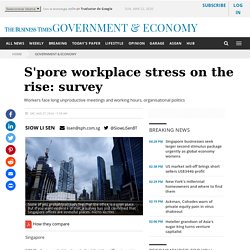
But if you want evidence of that, a survey has just confirmed that Singapore offices are stressful places. The survey "Working in Asia", by Roffey Park, has found that not only do Singapore workers spend more hours at work relative to their Hong Kong and China peers, more than half (52 per cent of Singapore workers surveyed) say their stress level has gone up over the last six months. Among Hong Kong workers, the figure is 43 per cent; among China workers, 45 per cent. Forty per cent of Singapore workers polled named office politics as a major stressor; 35 per cent cited workload and 35 per cent, lack of support. Stay updated with BT newsletters The survey found workload, lack of support and organisational politics to be the top three sources of workplace stress for workers across China, Hong Kong and Singapore. "This results in a burnout culture.
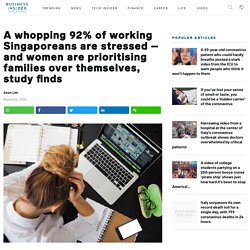
TODAYonline. SINGAPORE — Singaporeans are not only sleep deprived, but they are also among the most stressed at work globally, according to a survey by health service company Cigna released on Tuesday (Mar 26).
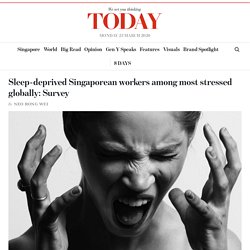
Nearly 92 per cent of Singaporeans surveyed were stressed from work, which was higher than the global average of 84 per cent. Of this group, 13 per cent said that the stress they faced was unmanageable. Singaporeans’ physical wellness index also dipped by 4.4 percentage points from last year, which the survey attributed to an increase in sleepless nights.
1 in 2 Singapore residents feels stressed out by the thought of doing nothing: Survey, Business News. SINGAPORE - Taking a break does not seem to come easy for stressed-out Singapore residents.
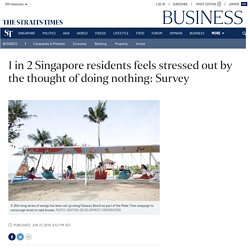
Of 600 Singaporeans and permanent residents polled in a recent survey, three in 10 said they did not know how to relax and half said they were stressed out by the thought of doing nothing. This is despite 52 per cent of those surveyed saying they felt stuck in a daily routine they were unable to get out of, and 74 per cent wishing they could spend more time with their families and loved ones. The survey, commissioned by Sentosa Development Corporation (SDC) and conducted online in April, also found that excluding mealtimes, people spent only 2.8 hours of leisure time on average with family and friends, or just slightly over 1 per cent of a week. Experts discussing the findings on Thursday (June 27) at a media event said that making time for self and family requires deliberate adjustments.
"Balance is impossible... The idea of work-life harmony has come to the fore recently. No Stress. StressedEmployee. Effects of Stress. Survey of 300 people finds that one in three has sex less than once a month, Health News. SINGAPORE- About a third of nearly 300 people polled in a recent survey said they have sex less than once a month.
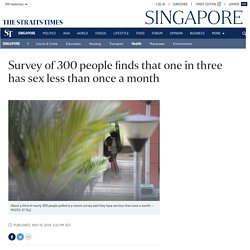
This is less than the once a week or once a fortnight frequency that most think is ideal, said Dr Colin Teo, President for the Society of Men's Health Singapore (SMHS), basing this anecdotally on what patients had told him. Stress Management. While it may seem like there’s nothing you can do about stress at work and home, there are steps you can take to relieve the pressure and regain control.
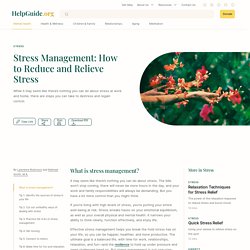
Why is it so important to manage stress? Coping with stress at work. Stress Management Techniques, Healthy Coping Strategies, Breathing Exercise. Exercise as Stress Relief. When you’ve been diagnosed with heart disease, you need to manage a number of new stressors on an ongoing basis.
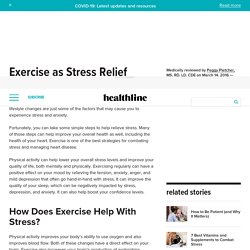
Dealing with more frequent doctor visits, getting used to new medical treatments, and adjusting to lifestyle changes are just some of the factors that may cause you to experience stress and anxiety. Fortunately, you can take some simple steps to help relieve stress. Many of those steps can help improve your overall health as well, including the health of your heart. Exercise is one of the best strategies for combating stress and managing heart disease. Physical activity can help lower your overall stress levels and improve your quality of life, both mentally and physically. How Does Exercise Help With Stress? Physical activity improves your body’s ability to use oxygen and also improves blood flow. Physical activity can also help take your mind off your worries. Some people notice an improvement in their mood immediately after a workout.
How Much Exercise Do You Need? Binaural Beats: Sleep, Therapy, and Meditation. When you hear two tones, one in each ear, that are slightly different in frequency, your brain processes a beat at the difference of the frequencies.
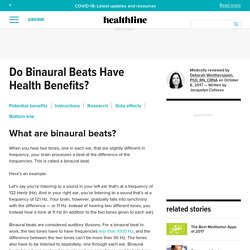
This is called a binaural beat. Here’s an example: How to Stop Worrying. Undoing the Worrying Habit Once acquired, the habit of worrying seems hard to stop.
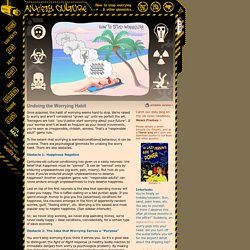
We're raised to worry and aren't considered "grown up" until we perfect the art. Teenagers are told: "you'd better start worrying about your future". If your worries aren't at least as frequent as your bowel movements, you're seen as irresponsible, childish, aimless. That's a "responsible adult" game rule. To the extent that worrying is learned/conditioned behaviour, it can be undone. Centuries-old cultural conditioning has given us a nasty neurosis: the belief that happiness must be "earned".
Laid on top of the first neurosis is the idea that spending money will make you happy. Spend Time in Nature to Reduce Stress and Anxiety. Keep Outside in Mind for Less Stress Spending time in nature can help relieve stress and anxiety, improve your mood, and boost feelings of happiness and wellbeing.
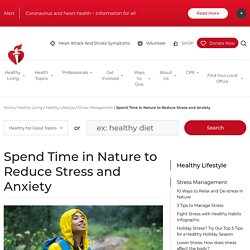
Whatever you call it – forest bathing, ecotherapy, mindfulness in nature, green time or the wilderness cure -- humans evolved in the great outdoors, and your brain benefits from a journey back to nature. Get Out Have you been feeling down lately? Government to publish advisory to help improve mental wellbeing in the workplace. SINGAPORE: The Ministry of Manpower (MOM) will soon be issuing an advisory to help employers take steps to improve mental wellbeing in the workplace. In his Committee of Supply speech on Tuesday (Mar 3), Minister of State for Manpower Zaqy Mohamad said that the ministry will formulate a Tripartite Advisory on mental wellbeing to educate employers on what can be done.
The advisory will highlight initiatives companies should emulate, and that could include access to anonymised external counselling service, or training supervisors to identify mental health symptoms early. MOM aims to finalise the advisory in the second half of this year. The ministry is also piloting iWorkHealth, a web-based psychosocial assessment tool to help employers and their employees identify workplace stressors, while recommending ways to improve mental well-being. The tool is expected to launch later this year. "Otherwise, employers should not be asking for information on the applicant’s mental health. "